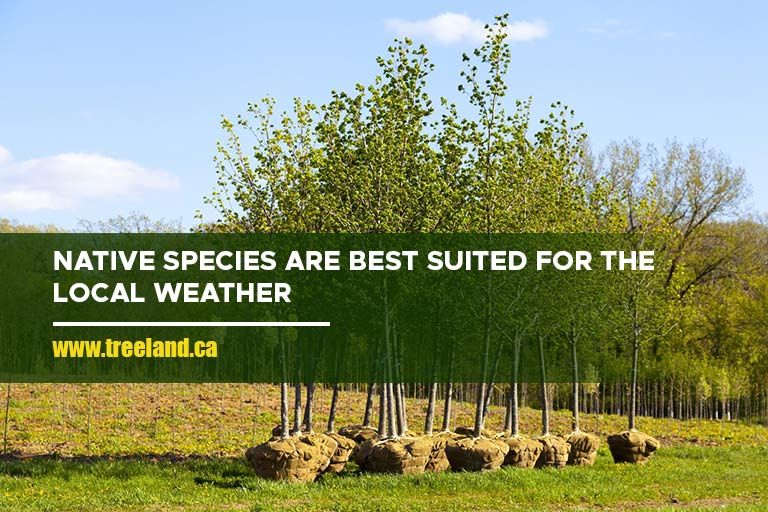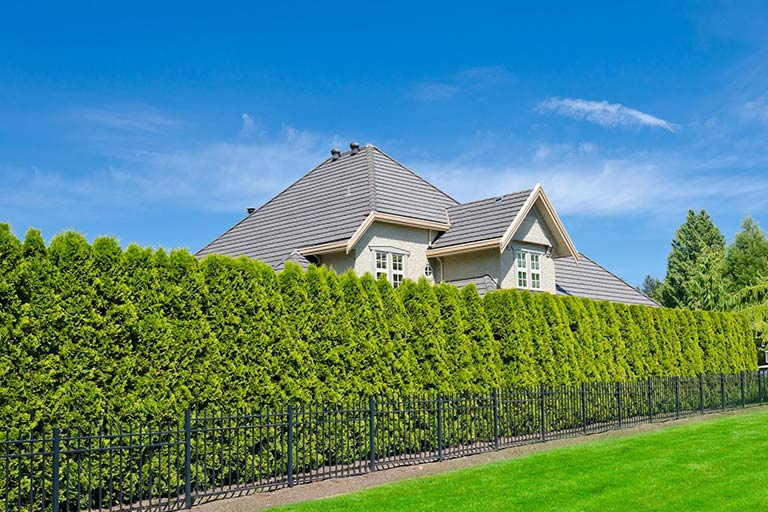In the bustling urban environment of the Greater Toronto Area (GTA), maintaining privacy can be a challenge. Fortunately, trees sellers offer a natural solution to create serene screens and boundaries. Discover how these living barriers can enhance your privacy while adding beauty to your space.
“Privacy is not an option, and it shouldn’t be the price we accept for just getting on the Internet.” – Gary Kovacs
Benefits of Using Trees for Privacy
Using trees for privacy offers a multitude of advantages, from environmental perks to enhancing the beauty and functionality of your landscape. Let’s explore these benefits in detail.
Environmental Advantages
Trees contribute significantly to environmental health, making them an excellent choice for creating natural privacy screens.
- Air Purification: Trees absorb pollutants like carbon dioxide, sulfur dioxide, and nitrogen dioxide, and release clean oxygen into the air. A mature tree will take up more than 48 pounds of carbon dioxide from the atmosphere in a year and release oxygen in return, according to the Arbor Day Foundation.
- Wildlife Habitat: Trees provide essential habitats for various wildlife species.
- Soil Conservation: Tree roots help to stabilize the soil, reducing erosion and runoff.
- Temperature Regulation: Trees offer natural cooling through the process of transpiration, where they release moisture into the air. Greg McPherson, an expert on urban forestry, claims that strategically placed trees can lower metropolitan temperatures by 2 to 8 degrees Fahrenheit (1-4 degrees Celsius).
Aesthetic Benefits

Trees add a touch of natural beauty that enhances any landscape, making your property more attractive and inviting.
- Landscape Enhancement: Trees provide structure, colour, and variety to your outdoor space. Deciduous trees bring vibrant colours in the fall, while evergreen trees offer year-round greenery. Flowering trees can add seasonal bursts of colour and fragrance.
- Property Value: Well-landscaped properties with mature trees are often more appealing to buyers and can increase your home’s market value.
- Seasonal Interest: Trees offer changing scenery throughout the year. From spring blossoms to summer shade, autumn foliage, and winter silhouettes, trees ensure that your landscape remains dynamic and visually interesting in every season.
Functional Benefits
Beyond beauty and environmental impact, trees offer practical advantages that can enhance your living environment.
- Noise Reduction: Trees act as natural sound barriers, absorbing and deflecting noise from traffic, neighbours, and other sources. Research indicates that a 30-meter-wide tree belt can effectively lower traffic noise by 5 to 10 dB, greatly enhancing the surrounding acoustics.
- Windbreaks: Strategically placed trees can act as windbreaks, reducing the impact of strong winds on your property.
- Privacy: Dense foliage creates an effective screen, blocking the view from neighbouring properties and public areas. This natural privacy enhances the sense of seclusion and security in your yard.
- Energy Savings: By providing shade in the summer and acting as windbreaks in the winter, trees can help reduce your energy bills. According to the U.S. Department of Energy, planting trees in strategic locations around your house can reduce heating and cooling energy use by up to 25%.
Popular Tree Species for Privacy in the GTA
When selecting trees for privacy in the Greater Toronto Area (GTA), it’s essential to choose species well-suited to the local climate. Here, we provide an overview of some popular tree choices, including their detailed descriptions and the pros and cons of each.
Cedar (Thuja occidentalis)
Cedars are a classic choice for creating privacy screens in the GTA. Known for their dense foliage and year-round greenery, they are a popular option for hedges and windbreaks.
- Pros:
-
- Evergreen: Provides privacy and greenery throughout the year.
- Dense Foliage: Excellent for creating a solid visual barrier.
- Fast-Growing: Can quickly establish a screen.
-
- Cons:
-
- Requires Maintenance: Regular pruning is necessary to maintain shape.
- Susceptible to Pests: Can be prone to issues like spider mites and bagworms.
-
Spruce (Picea spp.)
Spruce trees are another excellent option for privacy screens. They are hardy and can tolerate the cold winters of the GTA, making them a reliable choice.
- Pros:
-
- Hardy: Can withstand harsh winter conditions.
- Variety: Several species (e.g., Norway Spruce, White Spruce) offer different sizes and growth habits.
- Low Maintenance: Requires less frequent pruning compared to other species.
-
- Cons:
-
- Slow-Growing: Some varieties take longer to reach maturity.
- Needle Drop: Can drop needles, requiring periodic cleanup.
-
Arborvitae (Thuja plicata)
Arborvitae, also known as Western Redcedar, is a popular choice for privacy hedges due to its tall, narrow growth habit and lush, green foliage.
- Pros:
-
- Tall and Narrow: Ideal for tight spaces where height is desired.
- Attractive Foliage: Provides a lush, green appearance year-round.
- Pest-Resistant: Generally less susceptible to pests compared to other evergreens.
-
- Cons:
-
- Moderate Growth Rate: Slower than some other privacy trees.
- Requires Well-Drained Soil: Does not perform well in poorly drained or waterlogged soils.
-
Eastern White Pine (Pinus strobus)
Eastern White Pine is a versatile tree that grows well in the GTA, offering both privacy and beauty with its soft, feathery needles.
- Pros:
-
- Fast-Growing: Quickly reaches maturity, providing rapid privacy.
- Soft Needles: Offers a unique, feathery appearance.
- Tolerant of Poor Soils: Can grow in a variety of soil types, including sandy and rocky soils.
-
- Cons:
-
- Requires Space: Grows quite large, needing ample space to thrive.
- Sensitive to Pollution: Can be affected by urban pollution and salt spray from roads.
-
Holly (Ilex spp.)
Holly trees and shrubs are also a good choice for privacy. They offer dense, glossy foliage and bright red berries, adding both privacy and seasonal interest to your garden.
- Pros:
-
- Evergreen: Provides year-round privacy.
- Attractive Berries: Adds visual interest and supports wildlife.
- Dense Growth: Excellent for hedges and screens.
-
- Cons:
-
- Slow-Growing: Takes time to establish a dense screen.
- Requires Well-Drained Soil: Needs good drainage to prevent root rot.
-
Cost Considerations
Creating a natural privacy screen with trees involves several cost factors, from the initial purchase to ongoing maintenance. Understanding these costs can help you make informed decisions and find budget-friendly options that offer long-term value.
Breakdown of Costs
- Tree Prices:
-
-
-
- Saplings: Smaller trees are more affordable and easier to transport.
- Mature Trees: Larger, more established trees cost more due to their size and the labour involved in planting them.
- Specialty Trees: Rare or specialty species often come with a higher price tag due to their uniqueness.
-
-
- Planting Services:
-
-
-
- Professional Planting: Hiring a landscaping service ensures proper planting and establishment of the trees.
- DIY Planting: Planting trees yourself can save money, but requires time, effort, and the right tools.
-
-
- Maintenance:
-
-
- Pruning and Trimming: Regular maintenance is crucial for healthy growth and aesthetics. This can be done professionally or as a DIY project.
- Fertilization and Pest Control: Annual treatments help keep your trees healthy and free from pests.
- Watering Systems: Installing a drip irrigation system helps ensure your trees receive consistent moisture, which is vital for their growth and health.
-
Budget-Friendly Options

For those looking to create privacy screens on a budget, consider these cost-saving strategies:
- Start Small: Purchase smaller saplings, which are more affordable and will grow into mature trees over time.
- Local Tree Farms: Check with local tree farms for native species, which are often cheaper and better suited to the local climate.
- Bulk Purchases: Some sellers offer discounts for bulk purchases, reducing the cost per tree when you buy in larger quantities.
- DIY Planting: Save on labour costs by planting the trees yourself. Be sure to research proper planting techniques to ensure healthy growth.
Potential Long-Term Savings and Value Addition to Property
Investing in trees for privacy can lead to significant long-term savings and add value to your property:
- Energy Savings: Strategically planted trees can reduce heating and cooling costs. Shade trees can lower summer cooling bills, while windbreaks can reduce winter heating costs.
- Increased Property Value: Mature trees can enhance curb appeal and can increase property values.
- Reduced Noise Pollution: Potential purchasers know that trees serve as natural sound barriers, lowering noise pollution and fostering a more tranquil living environment.
- Environmental Benefits: Trees improve air quality, provide wildlife habitats, and contribute to soil conservation, making your property more attractive to environmentally conscious buyers.
Transform Your Outdoor Sanctuary
Whether you prefer the year-round greenery of cedars, the robustness of spruces, or the slender profile of arborvitaes, each option contributes to a more serene and sustainable outdoor environment.
Consider your preferences and long-term goals when selecting and caring for your trees. For a wide range of privacy trees for sale in the GTA and expert advice, reach out to Caledon Treeland at (905) 880-1828. Transform your outdoor space today with the natural charm and practical benefits that trees provide.

